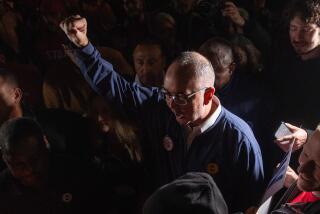Big 3 fail to close deal on bailout
- Share via
WASHINGTON — Embattled U.S. automakers added a new entry to their list of troubles Wednesday: executive jet travel.
For a second straight day, the chief executives of Detroit’s Big Three tried to convince a skeptical Congress that they deserved $25 billion in emergency loans. But that message was nearly drowned out by discussion of their corporate flying habits, and the Senate later scrapped plans for a vote on the loans today -- dimming hopes for a rescue plan this year.
The executives from General Motors, Ford and Chrysler insisted that they had gotten serious about producing smaller, fuel-efficient vehicles. They also told how they trimmed corporate fat and renegotiated generous union contracts so they could better compete with foreign automakers.
But under scornful questioning by members of the House Financial Services Committee, the CEOs conceded that when they came to Washington to plead for government aid, each of them had traveled on a private plane.
“There’s a delicious irony in seeing private luxury jets flying in to Washington, D.C., and people coming off of them with tin cups in their hands saying that they’re going to be trimming down and streamlining their businesses,” said Rep. Gary L. Ackerman (D-N.Y.) “There’s a message there.
“I mean, couldn’t you all have downgraded to first class or jet pooled or something to get here? It could have at least sent a message that you do get it.”
The criticism from Ackerman and other lawmakers -- who travel back to their districts on commercial airlines -- highlighted why the auto executives’ request for emergency money remains stuck on the runway. Many members of Congress worry that Detroit has not changed its big-spending, gas-guzzling habits, and that company executives will be back in a few months asking for billions of dollars more to stay afloat.
“My fear is you’re going to take this money and continue the same stupid decisions you’ve made for 25 years,” said Rep. Michael E. Capuano (D-Mass.), who noted that the U.S. automakers fought him and other lawmakers for years over tougher fuel-efficiency rules that finally passed in 2007.
On Wednesday night, Senate Majority Leader Harry Reid (D-Nev.) canceled plans to vote on a bailout bill. Although the loans still could be added this week to legislation to extend unemployment benefits, the move probably ends any chance for automaker aid until President-elect Barack Obama takes office in late January with larger Democratic majorities.
The chief executives -- GM’s Rick Wagoner, Ford’s Alan Mulally and Chrysler’s Robert Nardelli -- said they had renegotiated their union contracts, started producing more fuel-efficient and alternative-energy vehicles, and were on the road to success until the financial crisis hit. Without emergency loans, the companies could be forced into bankruptcy, causing as many as 3 million workers with ties to the industry to lose their jobs.
“Helping the auto industry bridge the current financial crisis will not only prevent massive economic dislocation now, it will produce enormous benefits for our country later,” Mulally said.
Financial Services Committee Chairman Barney Frank (D-Mass.) has proposed extending $25 billion in loans from the $700-billion rescue fund. The loans would be repaid with interest and come with stock options, limitations on executive compensation and oversight by a government board that could veto any company expenditures of more than $25 million.
Frank said there was a double standard by some lawmakers who have criticized the Big Three for paying their union workers more than U.S. employees who work for foreign automakers, whose plants are usually non-union.
A study by a University of Michigan professor found that average hourly pay for a Big Three worker in 2007-08 was $73.20, compared with $48 for a Toyota worker.
But Alan Reuther, legislative director for the United Auto Workers, said those costs include retiree benefits that are ending. Union and company officials said the pay differences between U.S. and foreign automakers would virtually be eliminated when the new contract terms took effect in 2010.
And Frank said the lawmakers who criticized union pay scales didn’t raise questions about the salaries of average employees of financial institutions, such as insurance giant American International Group, that got bailout money.
“I think the average AIG worker gets a good deal more than the autoworkers,” Frank said. “There is apparently a cultural conditioning that’s more prepared to accept aid to the white-collar industry than to the blue-collar industry.”
But it was the white collars of the CEOs that became the focus of the hearing. Only Nardelli agreed to reduce his own salary to $1. And news of their travel to Washington on private jets riled their listeners. None of the three top executives raised a hand when asked if their flights were on commercial carriers.
Rep. Patrick T. McHenry (R-N.C.) said flying to Washington on expensive private jets was “a bit arrogant before you ask the taxpayers for money.”
“Those type of symbolic things, they really matter, they set a tone,” said Rep. Peter Roskam (R-Ill.).
All three companies said they required their chief executives to fly on private planes for security reasons. None would identify the type of plane used or the number of people who traveled to Washington.
GM and Ford have corporate jets. Chrysler does not, but uses leased or chartered planes.
--
richard.simon@latimes.com








